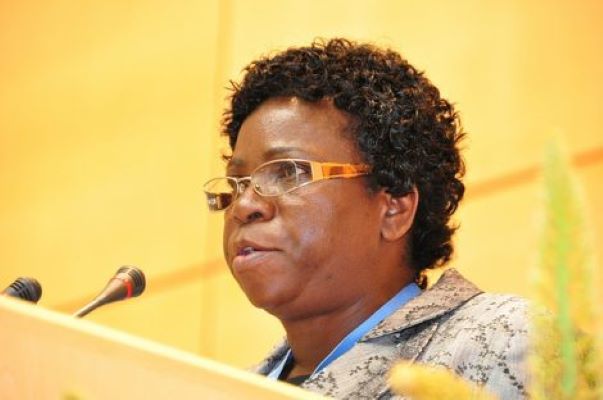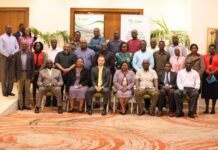Zambia remains committed to fighting hunger by 2030 among its 18+ million citizenry through various interventions to counter headwinds affecting the global food security systems but needs the support from cooperating partners, says vice President Mutale Nalumango.
During the United Nations Food Systems Summit on 23 September two years ago in New York, President Hakainde Hichilema assured the global summit of Zambia’s unwavering commitment to ending hunger by the close of this decade through interventions but that the vision to promote food and attain nutrition security needed support from other stakeholders.
Officiating at the World food day networking meeting in Lusaka, Tuesday, ahead of the World Food day on 16 October dubbed: “Leaving no one behind, better production, better nutrition, a better environment, and a better life”, Vice President Nalumango called for collaboration with other interest groups in finding durable and lasting solutions in addressing global food and nutrition insecurity challenges, Zambia included.
The remedies or interventions devised to counter climate change, ever rising food prices, COVID 19, among others, should strive to ensure all Zambians, children and women included have regular access to healthy and notorious foods without excluding anyone.
Zambia has taken significant strides to counter these unprecedented setbacks and unveiled the Food and Nutrition Act, 2020, aimed at driving the food and nutrition agenda with support from a committee of senior Government officials.
The idea calls for the inclusion of various partners in ensuring nutrition security and the sustainable growth of the country’s agrifood systems and counter threats of hunger.
Other policies include implementing the first 1,000 most critical days Phase ii programme under the framework of scaling up nutrition agenda, a huge multi-sectoral programme being implemented in the country supported by various cooperating partners.
The ongoing review and planned formulation of a Second National Agricultural Investment (NAIP2), a blueprint intended to improve and revolutionise agriculture for sustained food security and is being supported by donors including the Agriculture Consultative Forum (ACF) are all efforts to fight hunger and poverty and promote nutrition for all.
“My office remains committed to working with development partners and other stakeholders in the formulation and implementation of policies, measures, regulations and programmes aimed at poverty reduction and ending hunger, through promoting food security, improved nutrition and sustainable agriculture, in keeping with sustainable development goal (SDG) No. 2.”
Food and Agriculture Organisation country representative Ms. Suse Filiipini commended Zambia’s resolve to mitigate the effects of hunger and poverty and recognized food as not only being the only key for individual well being, but highly significant for the economic development of our country.
The United Nations food agency recognises the food production sectors such as agriculture, fisheries, livestock and natural resources and their interplay with the industry and other sectors in a complex food system.
FAO commended the Government’s commitment to transforming the food systems and make it more efficient, resilient and sustainable as a lasting solution to achieving the food systems transformation agenda.
Ms. Filiipini reiterated FAO’s commitment to promoting global awareness creation and action for populations battling hunger, and not leaving anyone behind while ensuring healthy and nutritious diets for all.
This is evidenced by Zambia’s natural endowment in arable land, water resources, favorable climatic conditions, enduring political goodwill, as well as an increasing and unmet demand for food commodities. She, however, noted the below par performance of the food sector which needs attention.
“Our food production systems continue to perform far below its potential for providing food security and nutrition, creation of jobs for women and youth, as well as its overall contribution to GDP. Even though we have made considerable progress towards reducing malnutrition and improving food security, too many people have been left behind”
Arguably, many people, she argued, remain excluded from the benefits of agriculture growth, human development, innovation and overall, economic growth. There is an urgent need for immediate action and concerted efforts.
“It calls for us as a country to work together towards better production, better nutrition, a better environment, and a better life for every Zambian, especially women and children who are the most vulnerable.
“It calls for us to ensure that all interventions or solutions implemented in our agrifood systems are green, holistic and sustainable, so as to enable us achieve economic growth and development which is inclusive, long term, and resilient. “She said.
At the same occasion, world food programme country representative Ms. Cissy Byenkya regretted the multiple effects the headwinds are causing on the majority Zambians after undermining food production as evidenced by the stagnant high rates of malnutrition, affecting especially women and children and the impact might sustain and more severe than other neighbors and requires attention.
“The effects of climate change remain among major risks to national food and nutrition security in Zambia. Even more worrying is the severity and frequency of the occurrences of prolonged dry spells and floods.
“Sadly, evidence shows that Zambia will continue to experience severe impacts of climate change, just like other countries in the southern African region.”
There is a need for awareness and affirmative action in improving the nutritional status of Zambians by promoting the consumption of adequate amounts of diverse, safe, and nutritious foods every day. There is dire need to safeguard ‘mother earth’ through the protection of the environment.
WFP reiterated its resolve to work with Zambia through innovative interventions and strengthen the resilience of communities and ensure better production, better nutrition, a better environment, and a better life for all.









